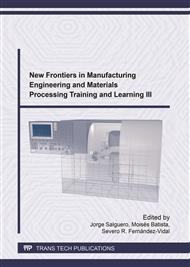[1]
R. Drath, A. Horch, A., Industrie 4. 0: Hit or hype? [Industry forum]. Industrial Electronics Magazine, IEEE, 8 (2014) 56-58.
DOI: 10.1109/mie.2014.2312079
Google Scholar
[2]
M. Hermann, T. Pentek, B. Otto, B., Design principles for Industrie 4. 0 scenarios: a literature review, Technische Universität Dortmund, 2015, 15 pp.
Google Scholar
[3]
R. Davies, Industry 4. 0 Digitalisation for productivity and growth. Briefing September 2015. European Parlamentary Research Service, PE 568. 337. [Available on]: http: /www. europarl. europa. eu/RegData/etudes/BRIE/2015/568337/EPRS_BRI(2015).
Google Scholar
[4]
MINETUR (Ministerio de Industria, Energía y Turismo). (2016). [On line] http: /www. industriaconectada40. gob. es/Paginas/Index. aspx.
Google Scholar
[5]
A. Majchrzak, A national probability survey on education and training for CAD/CAM, IEEE Transactions on Engineering Management, 4 (1986) 197-206.
DOI: 10.1109/tem.1986.6447679
Google Scholar
[6]
S. A. Rajala, Beyond 2020: Preparing engineers for the future. Proceedings of the IEEE, 100 (Special Centennial Issue), (2012) 1376-1383.
DOI: 10.1109/jproc.2012.2190169
Google Scholar
[7]
J.E. Froyd, P.C. Wankat, K. A. Smith, Five major shifts in 100 years of engineering education. Proceedings of the IEEE, 100 (Special Centennial Issue) (2012) 1344-1360.
DOI: 10.1109/jproc.2012.2190167
Google Scholar
[8]
C.W. Dankwort, R. Weidlich, B. Guenther, J.E. Blaurock, Engineers' CAx education—it's not only CAD, Computer-Aided Design, 36 (2004) 1439-1450.
DOI: 10.1016/j.cad.2004.02.011
Google Scholar
[9]
G. Schuh, T. Potente, C. Wesch-Potente, A.R. Weber, J.P. Prote, Collaboration Mechanisms to increase Productivity in the Context of Industrie 4. 0, Procedia CIRP, 19 (2014) 51-56.
DOI: 10.1016/j.procir.2014.05.016
Google Scholar
[10]
J. Ríos, et al., Product avatar as digital counterpart of a physical individual product: literature review and implications in an aircraft, 22nd ISPE Intl. Conf. on CE, 2 (2015) 657-666.
Google Scholar
[11]
C. Vila, et al., Project-based collaborative engineering design and manufacturing learning with PLM tools, Cooperative Design, Visualization, and Engineering, (2009) 367-371. Springer.
DOI: 10.1007/978-3-642-04265-2_55
Google Scholar
[12]
R. Mejia-Gutierrez, et al., Engineering education through an intercontinental PLM collaborative project: The Global Factory Case Study, Frontiers in Education Conf., October 2014 IEEE.
DOI: 10.1109/fie.2014.7044159
Google Scholar
[13]
E.A. Fielding, et al., Product lifecycle management in design and engineering education: International perspectives, Concurrent Engineering, 22 (2014) 123-134.
DOI: 10.1177/1063293x13520316
Google Scholar
[14]
K. Kear, J. Woodthorpe, S. Robertson, M. Hutchison, From forums to wikis: Perspectives on tools for collaboration, The Internet and Higher Education, 13 (2010) 218-225.
DOI: 10.1016/j.iheduc.2010.05.004
Google Scholar
[15]
J. J Márquez, et al., New methodology for integrating teams into multidisciplinary project based learning, The Intl. J. of Eng. Education, 27 (2011) 746-756.
Google Scholar
[16]
F. Segonds, et al., Educational practices for collaborative distributed design of an innova-tive eco-designed product, 14th Intl. Conf. on Eng. & Product Design Educ., (2012) Antwerp, Belgium.
Google Scholar
[17]
D. Schaefer, et al., Distributed Collaborative Design and Manufacture in the Cloud–Motivation, Infrastructure, and Education, ASEE 2012 Annual Conf. and Exp. Univ. of Bath.
Google Scholar
[18]
J.E. Mills, D.F. Treagust, Engineering education—Is problem-based or project-based learning the answer, Australasian Journal of Engineering Education, 3 (2003) 2-16.
Google Scholar
[19]
C. Vila, et al., Collaborative product development experience in a senior integrated manufacturing course, Intl J. of Engineering Education, 25 (2009) 886-899.
Google Scholar
[20]
A. Gomendio, M. Zabala, A. Cuende, L. Aretxabaleta, J. Aurrekoetxea, Desarrollo de una carrocería de material compuesto de fibra de carbono para un coche de radiocontrol mediante la metodología de aprendizaje PBL, XIX Congreso Nac. Ing. Mecánica, Castellón, (2012).
DOI: 10.5944/bicim2022.074
Google Scholar
[21]
J. Zins, N. Bonzani, A world first in collaborative cross-discipline agriculture and engineering education project, Intl. Journal of Mechanical Engineering Education, 43 (2015) 135-144.
DOI: 10.1177/0306419015590716
Google Scholar
[22]
D. Morales-Palma, et al., Teaching Experience for the Virtualization of Machine Tools and Simulation of Manufacturing Operations. In Materials Science Forum, 853 (2016) 79-84.
DOI: 10.4028/www.scientific.net/msf.853.79
Google Scholar
[23]
M. I. Zubizarreta, J. Altuna, Diseño de los Grados en Ingeniería y su modelo de implantación en Mondragon Unibersitatea. La cuestión universitaria, 5 (2009) 17-32.
Google Scholar
[24]
M. Batista, et al., Design and Development of Integrated Lab-Practical Class in Manufacturing Engineering, Materials Science Forum 759 (2013) 27-38.
Google Scholar
[25]
ENIM (Ecole National d'Ingénieurs de Metz), Lorraine INP. Factory Futures. (2016). [On line] http: /factory-futures. univ-lorraine. fr/the-project.
Google Scholar


